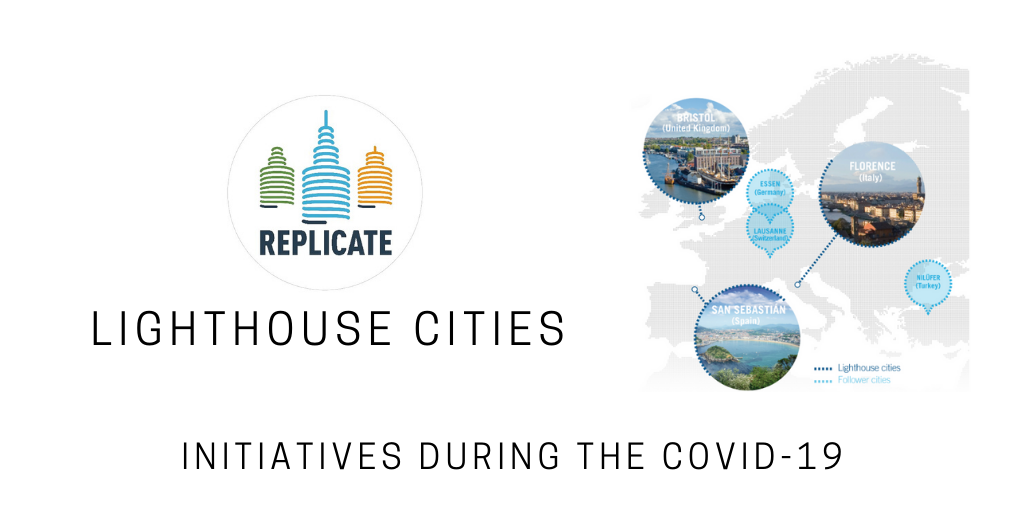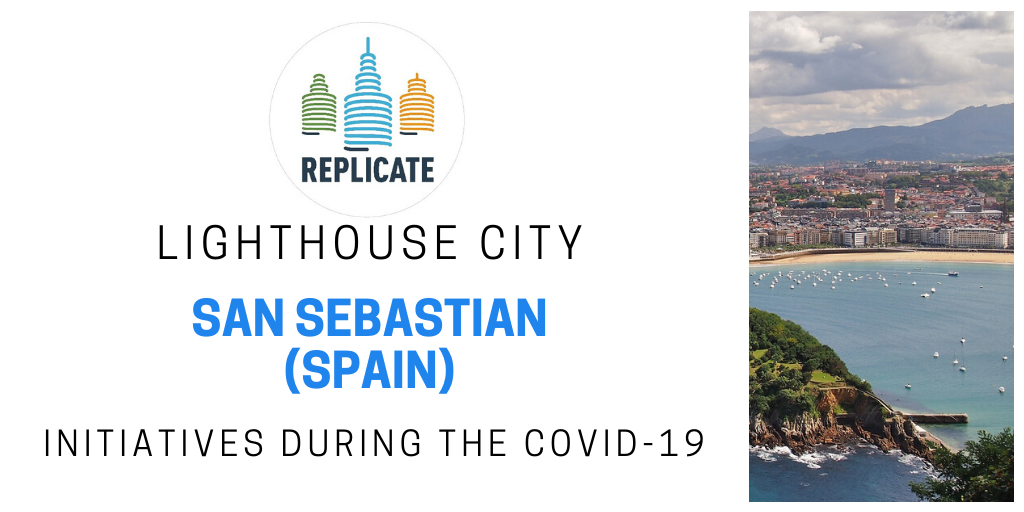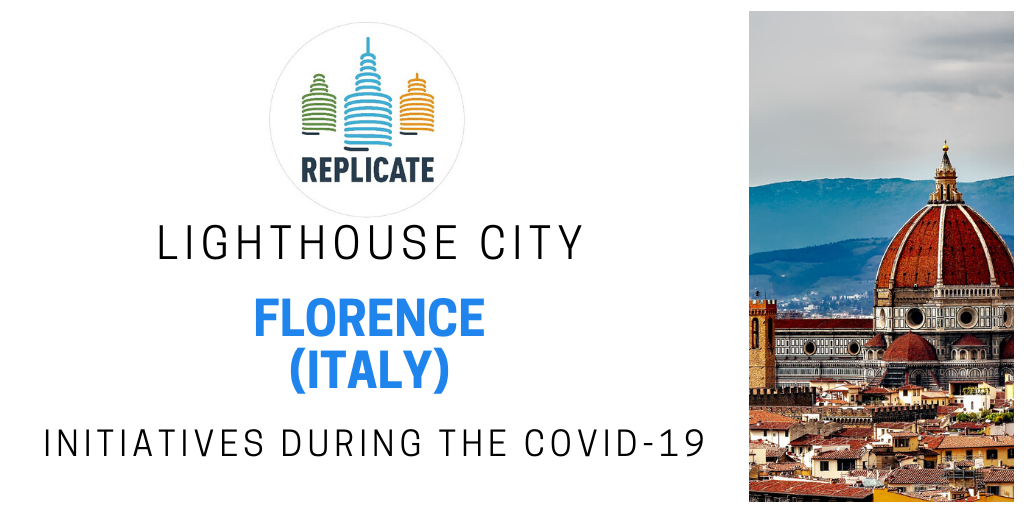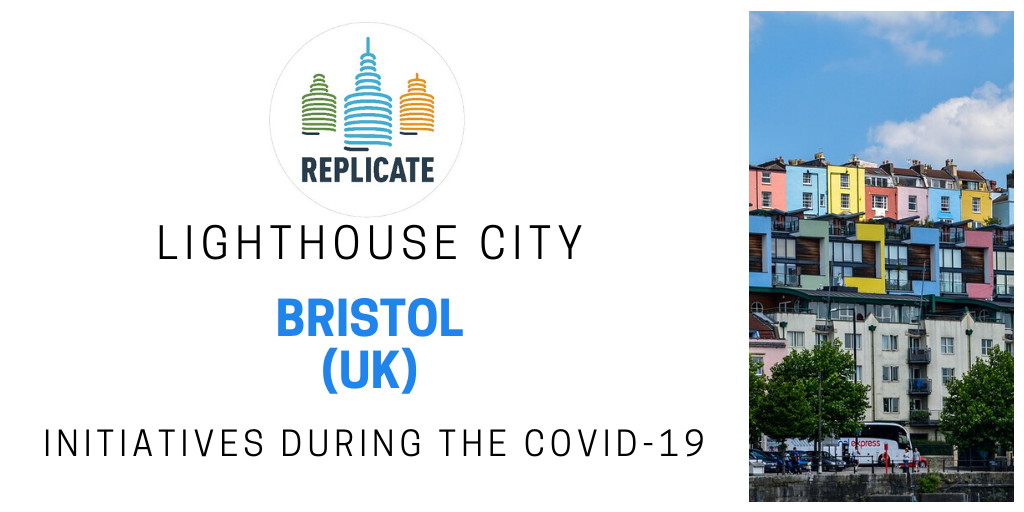Examples of initiatives carried out by the REPLICATE Project’s cities of San Sebastián, Florence and Bristol
Lighthouse cities of Replicate project, San Sebastian, Florence and Bristol as well as the fellow cities of Essen, Lausanne and Nilüfer together with the rest of the partners have continued working on the project during these months. Many cities across Europe are now facing a social and economic emergency because of the Corona pandemic, but are key for a sustainable and green recovery in Europe.
The Replicate project is a co-financed by the H2020 programme contract number 691735 (SCC1 European Call for Smart Cities and Communities) and coordinated by Fomento San Sebastian. Replicate project aimed to develop and validate a sustainable city business model in the lighthouse cities of San Sebastian, Florence and Bristol to improve the transition process towards a Smart City in the fields of energy efficiency, sustainable mobility and ICTs/Infrastructures, accelerating the deployment of innovative technologies, increasing the quality of life of the citizens, and influencing the replication process. The project is currently facing last year of the project.
During these months monitoring of the interventions as well as other activities have been carried out in the project framework. Moreover, cities have launched differente initiatives related to the situation created by the Covid 19:
In the lighthouse city of San Sebastian the Smart City Platform implemented in the Replicate project framework has been used to display different information about the Covid-19.
A map of the influence of the corona in San Sebastian was created. It included the evolution of the pandemic in the city, and the number of cases by health center.
DBUS project partner, launched an initiative through which invited parents to “design and build” with their children a bus with recyclable materials. Is an idea to keep kids doing something while the COVID19 is outside and give resources to the parents.
The police offered a service consisting on congratulate children for their birthdays through the window.
A network has been also created to help the citizens during the COVID-19. It consists of offering resources between neighbors so that they can help each other: help with shopping, walking pets, psychological support, etc.
The city of Florence is adapting its strategies to new challenges taking into account also external impacts of public policies. For example, regarding sustainable mobility, as described in a recent joint SCC1 project webinar (slides available here) Florence has exploited its Smart city control room to support the sustainable management of the city in the different emergency phases: from the lockdown impacts analysis on traffic and air quality, to the forecast on mobility in the third phase supporting companies in their choices about flexible working hours next autumn. In parallel, beside existing infrastructures and public services, additional car and bike (traditional and electric) sharing fleets will be tendered and new bike lanes tested with emergency plans to be integrated into the network.
The new APPs about mobility choices (IF – Infomobility Florence), sustainable behaviors (Goal green) and tourism management (Feel Florence) have been adapted, tested and promoted in the last period.
Free public spaces have been offered to bars and restaurants and green areas enriched with new trees (partially donated by citizens) while a new participated plan for green and parks is under development
Crowdfunding, ‘Firenze per Firenze’ has been activated to support people in need and additional financial support to the national incentives program, also through agreements with financial institutions and technology providers or tax discounts, is in place to support energy efficiency and domestic comfort.
Dario Nardella, the Mayor of Florence, thinks that from this crisis could also rise an opportunity: ”It’s not only time for emergency aid. It’s also time to rethink things to build back better. Instead of turning off the lights in my city, because of the financial costs of the crisis, I want cities to light the way.”
Despite the crisis, the sustainable targets of the city has not changed but even become more ambitious. For the Mayor “Cities have to enhance existing cooperation across borders all over Europe, to learn from each other and share best practices inspiring national and European politics to become more resilient and implement a sustainable & green recovery.”
In the lighthouse city of Bristol they are investing £9m into adult social care in the next 3 months with the expectation of building resilience in the local care system, so they can continue to care for vulnerable people and develop capacity to meet the extra demand caused by COVID-19.
‘Can do Bristol’ network was launched that consists on a volunteering network to support others.
The Bristol City Council collaborated to offer discounted bikes (£ 100 off) to key workers if they need, irrespective of income.
Replicate project will continue working during the last months of the project.



